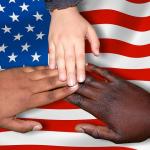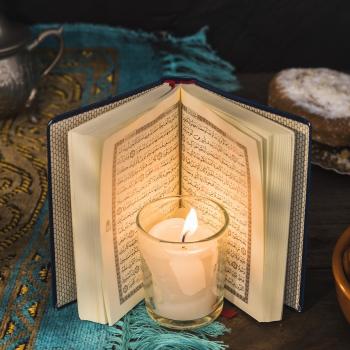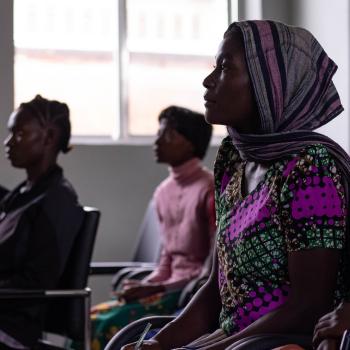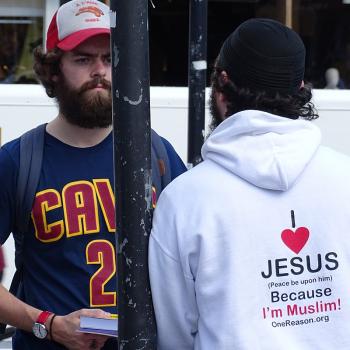 Let me start by saying I am very proud of being an American Muslim. I am happy to be a Muslim and happy to be an American. However, it is becoming increasingly difficult to feel proud and convey this pride to your offspring. American youth is increasing more confused about their identity, and some feel defensive about their Muslim identity.
Let me start by saying I am very proud of being an American Muslim. I am happy to be a Muslim and happy to be an American. However, it is becoming increasingly difficult to feel proud and convey this pride to your offspring. American youth is increasing more confused about their identity, and some feel defensive about their Muslim identity.
Media and public biases against American Muslims are increasingly brought to limelight. Earlier this month, Kumar Rao and Carey Shenkman, two of ISPU’s (Institute of Social Policy and Understanding, led by Dalia Mogahed) research fellows, published their report titled, Equal Treatment?: Measuring the Legal and Media Responses to Ideologically Motivated Violence in the United States. [1]
Our analysis of the examples examined in this report found that, for similar plots, Muslim-perceived perpetrators receive harsher legal charges and longer prison sentences than their non-Muslim counterparts. Perpetrators identified as Muslim also had qualitatively different media coverage than perpetrators not identified as Muslim.
The differences were often stark:
● On average, prosecutors sought three times the sentence length for Muslim perpetrators as for perpetrators not identified as Muslim for similar plots of attempted ideologically driven violence (230 months vs. 76 months). Additionally, Muslim perpetrators received four times the average sentence as their non-Muslim counterparts for attempted plots of similar conduct (211 vs. 53).
● Moreover, undercover law enforcement or an informant provided the means of the crime (such as a firearm or inert bomb) in a majority (two-thirds) of convictions in plots involving a perceived Muslim perpetrator, but in a small fraction (two out of twelve) of those involving a non-Muslim perpetrator.
● In terms of print media coverage, Muslim-perceived perpetrators received twice the absolute quantity of media coverage as their non-Muslim counterparts in the cases of violent completed acts. For “foiled” plots, they received 770% the media coverage as their counterparts.
● Differences also extended to media references to a perceived Muslim perpetrator’s religion as compared to ideologies of perceived non-Muslims, mentions of specific phrases such as “terrorist” or “terrorism,” and coverage of the ultimate prison sentences.
This is yet another report showing the built in biases towards American Muslims by the media and in this case, law enforcement and judicial system. As American Muslims struggle to find comfort in the ever-increasing Islamophobic environment we now live in, here are 7 things our Non Muslim American friends don’t have to worry about.
- You don’t have to defend your religion every step of the way. If the priest abuses a child, it is his problem or his church’s problem. The religion itself escapes the ire, by and large, though I understand sometimes all of Christianity or Catholicism gets blamed. If a right wing Christian commits an act of terrorism, it is because he is mentally ill, even if the religion was implicated. Whenever there is an act of terrorism, your first reaction is, hope everyone is safe, rather than “I hope the culprit is not a Muslim, so we won’t be subject to a non-stopped media coverage of ‘Islamic terrorism’ again.
 2. You can choose to dress however you prefer. You don’t have to explain why you cover your head, and that you are not oppressed if you do choose to wear a headscarf. You don’t have to explain that you do it as a result of exercising your free will to express your religious identity.
2. You can choose to dress however you prefer. You don’t have to explain why you cover your head, and that you are not oppressed if you do choose to wear a headscarf. You don’t have to explain that you do it as a result of exercising your free will to express your religious identity.
3. You don’t have to worry about your children being bullied at school, or called “little terrorists”. You don’t have to explain to your 6-year old son as to what “terrorist” means, let alone why he is being called that.
4. You don’t have to worry about being stopped at the airport because of your name and looks. You don’t have to worry about going through secondary screenings. You don’t have to worry about how you are going to tell your children as to why dad was held separately for questioning, as they won’t understand, “I was stopped not for what I did, but rather for who I am”.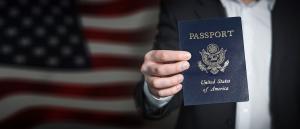
5. When you go the church, synagogue or temple, you don’t have to worry whether your place of worship is being wiretapped or under surveillance. You go with the only purpose these places are meant for- to worship and provide community service. When you want to build a new church, you don’t have to struggle to convince your neighbors and city councils that you are building the place of worship for religious and community services.
6. When you apply for work, you don’t have to worry whether your religious identity, beliefs or “looks” may be barriers to you obtaining the job and/or getting a promotion.
7. You don’t have to worry about celebrating your religious holidays ‘quietly’, or have to struggle with the school district as to why your child needs a day off to celebrate a religious holiday and why he/she should not be expected to complete homework even when off for a religious holiday. Yes I do understand our Christian cousins get the Christmas and Easter breaks ( which are often at the same times as some of the Jewish holidays) because they are the predominant faith traditions in America. I am totally fine with that. I also understand other religious minorities also don’t get to have their religious holidays be ‘sanctioned’ by school or work. But they don’t feel as ‘defensive’ or fearful as American Muslims do while requesting time off, often ending up just calling in sick, or just taking a “personal day off”.
Once again, I am proud and happy to be living in the land of plenty and the land of opportunity, and in a country where freedom of speech and religious expression forms the foundation of the constitution. But these constitutional civil liberties are increasingly being challenged. I can only hope and work for what made our country so great- our diversity and freedom of speech and religious expression.
[1] https://www.ispu.org/public-policy/equal-treatment/


